
German postcard by Ross Verlag, no. 3825/1, 1928-1929. Photo: Derussa.
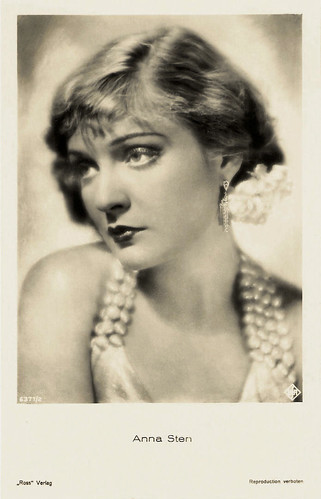
German postcard by Ross Verlag, no. 6371/2, 1931-1932. Photo: Ufa.
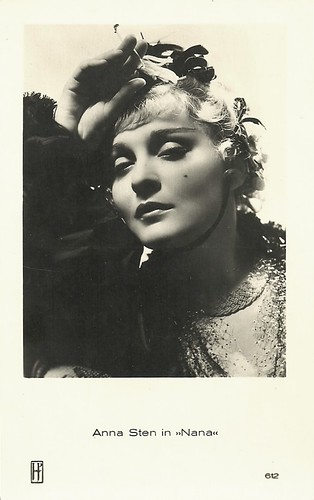
Dutch postcard by JosPe, Arnhem, no. 612. Anna Sten in Nana (Dorothy Arzner, George Fitzmaurice, 1934).

British postcard by De Reszke Cigarettes, no. 6. Photo: United Artists. Publicity still for Nana/Lady of the Boulevards (Dorothy Arzner, George Fitzmaurice, 1934).

British postcard in the Famous Film Stars Series by Valentine's, no. 7123B. Photo: United Artists. Publicity still for Nana (Dorothy Arzner, George Fitzmaurice, 1934).
Waitress
Anna Sten was born Anna Petrovna Fesak in Kyiv (Kiev), Ukraine, Russian Empire (now Kyiv, Ukraine) in 1908. The Ukrainian website The Odessa Journal: "Information about the family is quite uncertain and vague. According to one version, Anna's father worked as a clerk in a shoe store, and according to another - her father was a professional dancer and director, and her mother, a Swede - a prima ballerina of the Kyiv Opera House. Where the truth is, we do not know. The waters of time seem to have closed forever over this story."
Anna worked as a waitress until she was discovered at the age of 15 while acting in an amateur play in Kyiv. According to another legend, her discoverer was the influential Russian stage director and instructor Konstantin Stanislavski, who arranged for her to get an audition at the Moscow Film Academy. She studied there and then acted in theatre plays. Boris Sten (Bernstein) became the first of her three husbands. The marriage was happy, albeit short. The name Sten stayed.
From 1926 on she also appeared in films. She married director Fyodor Otsep a.k.a. Fedor Ozep the following year, but they divorced in 1931. Sten appeared in classic Russian films such as Devushka s korobkoy/The Girl with a Hatbox (Boris Barnet, 1927), Zemlya v plenu/Land in Captivity (Fyodor Otsep, 1928), and Belyy oryol/The Lash of the Czar (Yakov Protazanov, 1928). Sten was in the past often mixed up with actress Anel Sudakevich. The two actresses played together in the films Zemlya v plenu/Land in Captivity (Fyodor Otsep, 1928) and Torgovtsi slavoj/Merchants of Glory (Leonid Obolenskij, 1929. The Odessa Journal: "There is a witty legend about how her friend, actress Galyna Kravchenko, came to visit Anna. She found her washing clothes, with all the aesthetics inherent in the Moscow communal services of the time - a basin, household soap, a washing board. Anna stood over those troughs messy, wet, and half-naked. Kravchenko was indignant: 'God! Look at yourself! You are a movie star!' To which Anna replied: 'But I'm a Soviet movie star!'"
Sten travelled to Germany to appear in films co-produced by German and Russian studios. These international productions were common in the early 1930s. Making a smooth transition to talking pictures, Anna appeared in such German films as Lohnbuchhalter Kremke/Payroll Clerk Kremke (Marie Harder, 1930) starring Hermann Vallentin, Salto Mortale/Trapeze (Ewald André Dupont, 1931) with Adolf Wohlbrück a.k.a. Anton Walbrook, and Stürme der Leidenschaft/Storms of Passion (Robert Siodmak, 1932) starring Emil Jannings.
Her husband's Der Mörder Dimitri Karamasoff/The Murderer Dimitri Karamazov (Erich Engels, Fyodor Otsep, 1931) based on the novel by Fyodor Dostoevsky, became her international breakthrough. The German-French coproduction was a huge success in Europe and America. In an obituary of Sten in the British newspaper The Independent, David Shipman writes: "It may still be the best screen transcription of that writer, with Fritz Kortner on magnificent form as Dimitri, and Sten as the trollop who causes his downfall. This was one of the screen's cliche roles, but Sten, part Marilyn Monroe, part Nancy Carroll, seemed never to have seen any previous screen vamp - let alone studied them".
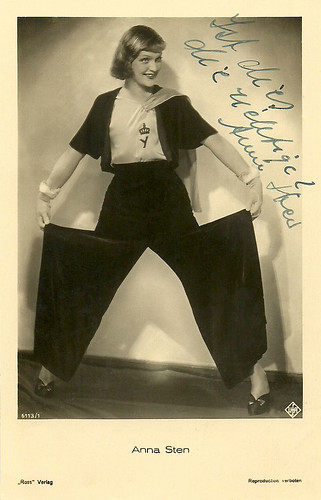
German postcard by Ross Verlag, no. 5113/1, 1930-1931. Photo: Ufa. Collection: Didier Hanson.
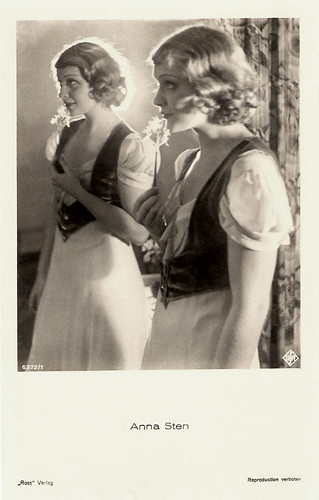 German postcard by Ross Verlag, no. 6372/1, 1931-1932. Photo: UFA.
German postcard by Ross Verlag, no. 6372/1, 1931-1932. Photo: UFA.
German postcard by Ross Verlag, no. 6646/2, 1931-1932. Photo: Vogel-Sandau, Berlin.

German postcard by Ross Verlag, no. 6371/1, 1931-1932. Photo: UFA.

British card. Photo: United Artists. Publicity still for Nana (Dorothy Arzner, George Fitzmaurice, 1934).

British postcard in the Picturegoer series, London, no. 831. Photo: United Artists. Publicity still for Nana (Dorothy Arzner, George Fitzmaurice, 1934).
The New Garbo
A photo of Anna Sten with her wide and high cheekbones and beautiful large eyes in Der Mörder Dimitri Karamasoff/The Murderer Dimitri Karamazov came to the attention of American movie mogul Samuel Goldwyn. He was looking for a foreign-born actress who he could build up as the rival of, and possibly a successor to, Greta Garbo. By that time, Anna had already divorced Ozep and married for the third time to architect and film producer Eugene Franke, a Russian emigrant. The couple hesitated because the position of Anna Sten in German cinema was stable. But at that time, the National Socialist clouds were already beginning to hang over Berlin. So Goldwyn's agent did sign Sten to a contract but forgot to mention that she didn't speak English, which made her appearance in sound pictures questionable.
For the next two years, Goldwyn had his new star tutored in English and taught Hollywood screen acting methods. Goldwyn's publicity called her 'The Passionate Peasant' and sold her image to papers all over America. Goldwyn's tutoring of Sten is mentioned in Cole Porter's 1934 song Anything Goes from the musical of the same name: "If Sam Goldwyn can with great conviction / Instruct Anna Sten in diction / Then Anna shows / Anything goes."
Her first American film was Nana (Dorothy Arzner, George Fitzmaurice, 1934), a somewhat homogenised version of Émile Zola's scandalous novel. Despite the publicity campaign, her first Hollywood production was a resounding box office failure, even though the film was almost completely rewritten and reshot from the original. Anna looked great, but the script and picture were average.
Her two subsequent Goldwyn films, We Live Again (Rouben Mamoulian, 1934) based on a novel by Leo Tolstoi, and The Wedding Night (King Vidor, 1935) with Gary Cooper were not box office successes either. Sten got nicknamed "Goldwyn's Folly". Reluctantly, Samuel Goldwyn dissolved his contract with his ‘new Garbo'.
David Shipman: "It was not perhaps a mistake on his part to publicise Sten as the new Garbo, since such was the fate of most of the other (female) European imports - though few of these remained residents of LA for long. It was an error to announce that her grooming would be in the hands of Dietrich's mentor Josef von Sternberg when neither he nor the equally autocratic Goldwyn ever took kindly to any ideas but his own. It was also foolish to spend two whole years with a constant barrage of publicity emerging about 'tests', plus the amounts being spent to turn Sten into a Hollywood 'personality', and on the search to find the vehicle to launch her".
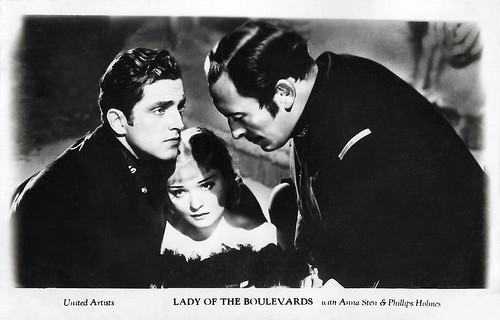
British postcard in the Filmshots series by Film Weekly. Photo: United Artists. Philips Holmes, Anna Sten and Lionel Atwell in Nana (Dorothy Arzner, George Fitzmaurice, 1934).

British postcard in the Filmshots series by Film Weekly. Photo: United Artists. Lionel Atwell, Anna Sten and Richard Bennett in Nana (Dorothy Arzner, George Fitzmaurice, 1934).

British postcard in the Filmshots series by Film Weekly. Photo: United Artists. Anna Sten and Richard Bennett in Nana (Dorothy Arzner, George Fitzmaurice, 1934).

British postcard in the Filmshots series by Film Weekly. Photo: United Artists. Anna Sten and Lionel Atwell in Nana (Dorothy Arzner, George Fitzmaurice, 1934).
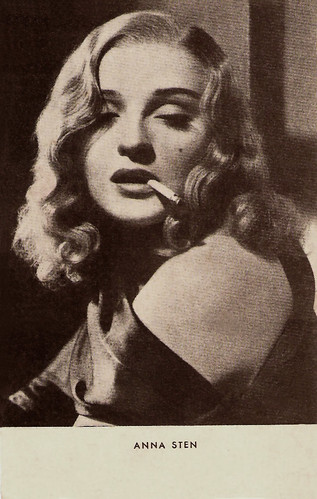
Portuguese postcard by Tip. Costa Sanches, Lisboa (Lisbon). Photo: publicity still for Nana (Dorothy Arzner, George Fitzmaurice, 1934).
Juvenile delinquent epic
Anna Sten retreated to Britain for the historical drama Two Who Dared/A Woman Alone (1936), directed and produced by her husband Eugene Frenke. Based on a novel by Fyodor Otsep, Sten plays a peasant girl in 19th-century Russia who falls in love with military captain Henry Wilcoxon.
Sten continued making films in Hollywood for Fox and Universal, including secondary roles in the melodrama The Man I Married (Irving Pichel, 1940) with Francis Lederer, So Ends Our Night (John Cromwell, 1941), and a lead in the propaganda film They Came to Blow Up America (Edward Ludwig, 1943) opposite George Sanders.
In the 1950s she attempted to revive her career by studying at the Actors Studio. This led to the tour of Bertolt Brecht and Kurt Weill's 'The Threepenny Opera', as Jenny, following its first presentation in New York, when Louis Armstrong's record of Mac the Knife did no harm at all. Sten found greater success with a new career - as a painter, exhibiting several times in New York.
In the late 1950s, she was seen as the mother of Marla English in the juvenile delinquent epic Runaway Daughters (Edward L. Cahn, 1956), produced at poverty row studio American International Pictures. Happily, Sten did not have to rely on acting to support her comfortable lifestyle. Since 1932, she was married to film producer Eugene Frenke, who flourished in Hollywood after following his wife stateside. Most of her latter-day film appearances were, in fact, favours to her husband.
She had an uncredited bit in the Frenke-produced Heaven Knows, Mr. Allison (John Huston, 1957) starring Deborah Kerr and a full lead in her final film (also produced by Frenke), The Nun and the Sergeant (Franklin Adreon, 1962) with Robert Webber. On TV she was last seen in the series Arrest and Trial (1963) starring Ben Gazzara. In 1993, Anna Sten died of a heart attack in New York at the age of 84. Sten had a daughter, Anya Sten.

Hungarian postcard by Globus, Budapest. Photo: United Artists / City Film. Publicity still for Nana (Dorothy Arzner, George Fitzmaurice, 1934).
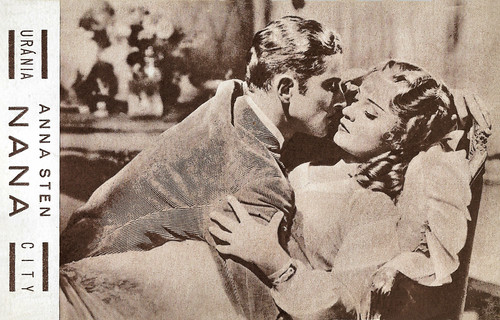
Hungarian postcard by Globus, Budapest. Photo: United Artists / City Film. Phillips Holmes and Anna Sten in Nana (Dorothy Arzner, George Fitzmaurice, 1934).
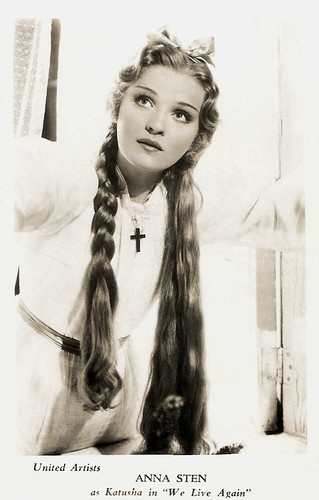
British card. Photo: United Artists. Publicity still for We Live Again (1934).
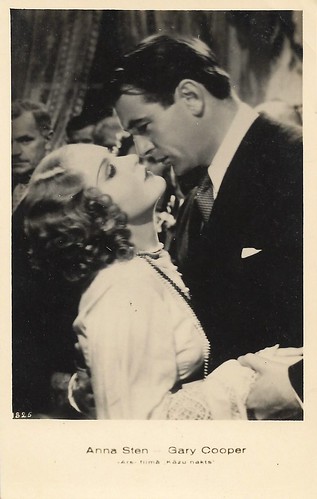
Latvian postcard. Anna Sten and Gary Cooper in The Wedding Night (King Vidor, 1935).
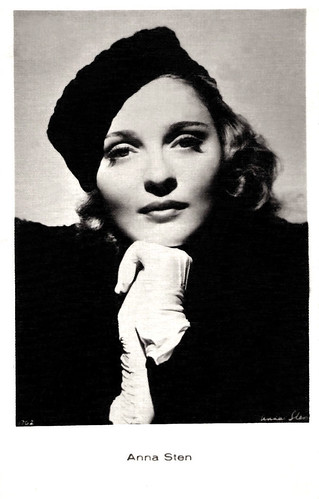
Latvian postcard by Izd. IRA.
The Russian comedy Devushka s korobkoy/The Girl with a Hatbox (1927). Source: History Club (YouTube).
Clip of The Wedding Night (1935) with Gary Cooper and Anna Sten. Source: HollywoodClassics33 Returns (YouTube).
Sources: The Odessa Journal, Calend.Ru (Russian), David Shipman (The Independent), Thomas Staedeli (Cyranos), Tony Fontana (IMDb), Hal Erickson (AllMovie - Page now defunct), Operator_99 (Allure), Wikipedia (English and German), and IMDb.
This post was last updated on 7 April 2025. Special thanks to Leonard H. Gmuer, who sent me corrections on an earlier version of this post and to Marlène Pilaete for her additional information.
5 comments:
Interesting post, but there is a mix-up of two actresses with similar names: Anna Sten (Sujakevich) and Anel Sudakevich:
"Anna Sten was born Anel (Anjuschka) Stenski Sudakevich" shoudl read: "Anna Sten was born Anjushka Stenski Sujakevich"
"From 1926 on she also appeared in films and made her first uncredited film appearance in Miss Mend (1926, Fyodor Otsep)." No, this is not correct. The actress was Anel Sudakevich.
"Sten appeared as Anel Sudakevich in more classic Russian films such as Devushka s korobkoy/The Girl with a Hatbox (1927, Boris Barnet), Potomak Chingis-khan/Storm over Asia (1928, Vsevolod Pudovkin), Zemlya v plenu/Land in Captivity (1928, Fyodor Otsep), and Belyy oryol/The Lash of the Czar (1928, Yakov Protazanov)"
Anle Sudakevich played Potomak Chingis-khan/Storm over Asia (1928, Vsevolod Pudovkin)
Both Anna Sten and Anel Sudakevich played in Zemlya v plenu/Land in Captivity (1928, Fyodor Otsep) and in Torgovtsi slavoj/Merchants of Glory (1929, Leonid Obolenskij)
"In 1927 she also worked on the curious collage film The Kiss of Mary Pickford which was produced on the occasion of a Soviet Union journey by Mary Pickford and Douglas Fairbanks without their knowledge by Sergei Komarow from newsreel footage."
This is wrong, it was Anel Sudakevich
For updated filmographies on both actresses see:
Anna Sten: http://www.kinotv.com/page/bio.php?namecode=98660&q=0&l=en
Anel Sudakjevich: http://www.kinotv.com/page/bio.php?namecode=100138&l=en
Hi Leonard,
Thank you for these corrections.
I'll update the post on Anna Sten with your information soon.
Regards,
Bob
Hi Bob,
Congrats for this effective facelift on Anna Sten. There is still one remark I'll like to make:
"Sten appeared as Anel Sudakevich in classic Russian films such as Devushka s korobkoy/The Girl with a Hatbox (1927, Boris Barnet), Zemlya v plenu/Land in Captivity (1928, Fyodor Otsep), and Belyy oryol/The Lash of the Czar (1928, Yakov Protazanov)." - This is not correct, and probably based on a non verified source. In fact, the titlecards of all three films clearly name "A. Sten" [А. Стен] or "Anna Sten" [Анна Стен] for Zemlya v plenu/Land in Captivity.
If you like, I can send you the relative frame enlargements.
Best regards
Leonhard H. Gmuer
unicornmedia@kinotv.com
Thanks again, Leonard. I've corrected it.
Post a Comment